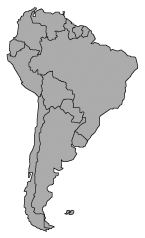You are here: Third Culture Kids > Transitions
Through Their Eyes Darkly
by Paul Nelson
Paul Nelson wrote Through Their Eyes Darkly when he was Superintendent of SIL’s children’s education department. Since then he has served as President of MTI and as Executive Director of The Crowell Trust in Colorado Springs, CO. Paul is now doing consulting work for international ministries related to organizational development and philanthropy.
When my family and I arrived in South America for the first time, we did not come with complete openness, free from prejudice and bias. In the weeks before we left home for service with SIL, we did everything we could to prepare ourselves to live in a different culture. We read numerous articles about Latin America. As we ate meals together, we talked about adjustments we would be making, and we contacted anyone we could who had been there. Each person with whom we talked, demonstrating a genuine desire to be helpful, had some stories to tell characterizing his experiences with the culture. Some friends loved the country and the people dearly, and their comments clearly reflected that love. Others had different experiences. Their stories were equally dramatic but highlighted a single, often negative, aspect of the culture. Consequently, our perspective of the culture was influenced by these stories, all of which were true but none reflecting the objective picture we thought we were getting.

Ministry workers' children1, who spend most of their lives in a culture outside their passport country (their parents’ home culture), are frequently in a similar position. Much of what they know of their passport culture they learn in the same way we learned about Latin America. They see their parents’ home culture through their parents’ eyes. By the time they reach high school they have, of course, been to their passport country, but in most cases these are transient contacts and impressions. This “tourist” perspective is often the product of the demands personal fund raising and additional training place on the furloughing ministry family.
After graduation from high school, most TCKs return to their passport country for further education and are forced to cope with life as it is lived there. Unfortunately, they do not all arrive with the motivation and skills needed for this imposing task. Most of them experience some difficulty, ranging all the way from innocuous judgmental comments to overt bitter resentment and rejection. Others openly embrace the life-style of their passport country, exercising very little restraint or discretion. They approach this task by acting on attitudes and assumptions acquired while growing up with other expatriates living outside their home culture. The sources of these attitudes may be difficult to identify and are not unique to the children of parents in ministry, but an observation of four experiences common to many TCKs may generate some constructive thought.
When a ministry colleague returns to the field following a furlough, at least some of his comments deal with the home society’s moral decline. This is often illustrated by a particularly graphic example from the entertainment industry, the instability of homes and family life, fashions, or violent crimes. Their children who attended school while on furlough tell their own stories of drugs and sex. These reports seem to be validated by the foreign editions of weekly news magazines they receive. While these stories and observations are accurate, they do not, of course, reflect the total picture. Without positive experiences of his own with which he can temper these reports, the TCK begins to build some strong biases.
Comments from returning colleagues may also extend to the spiritual condition of the parents’ home-country church. As they tell of fund-raising experiences, which include reports of fatal involvement with materialism and growing indifference toward missions, the listening TCK may again be drawing conclusions from incomplete information. These young people may already have some serious doubts about the spiritual condition of churches in their passport country because of such problems as declining financial support and a scarcity of answers to family prayer letters. They lack the balance of love and concern their parents know from the close fellowship they experienced as members of a local church prior to their ministry service.

The reasons for discussing these two elements, moral decline and spiritual indifference, would seem to be obvious but they may go beyond that. Part of the explanation for this criticism may be the process one goes through when returning overseas while readjusting to the very different life-style. It is much easier to adjust to the hardships at hand if one views the alternative from a negative perspective. This same thinking may be a third source of negative bias toward the passport culture to which TCKs are exposed. Every parent wants the very best for his children. Some ministry parents, recognizing the hardships their children go through and the opportunities they miss because of their involvement in overseas ministry, experience feelings of guilt to varying degrees. In order to compensate for these feelings, they may make statements that tend to highlight the worst in home-country life. If they can convince their children and themselves that life overseas, with all its inconveniences and limitations, is better than life in their passport country, the guilt can be alleviated to some extent. While this may help the parents deal with this very real problem, the child’s negative attitudes toward their passport country are continuing to grow.
A fourth source of negative bias toward the passport culture is often intermingled with the TCK’s concept of who he is in relation to the community around him. The reference here is not to the frequent problem of the child feeling that he is a hindrance to his parents’ work. It is rather a racial or ethnic superiority expatriates often experience in a third world country. The TCK may be accustomed to having nationals as servants in his home. He grows up with the perspective that people of this culture need help from him and his parents. Expatriates acquire a “built in” recognition and respect, which may not be realized until the young person returns to his passport country, and he no longer has it. He is no longer “somebody” just because of this nationality and the color of his skin. This may remove him from a very important source of identity he has always had. From his perspective it is the people in his passport-country society who do not accept him or care about him.
All four of these factors may cause a TCK to reject the notion that after graduation from high school she should look forward to becoming part of the North American life-style. She may find that she has a difficult time adjusting because she has never seen her passport-country culture in a consistently favorable light and chooses not to seek her identity in it. By this time in her life, however, her options are very limited. She cannot return to the field with her parents on anything but a temporary basis. The issue is forced and adjustments must be made.
The feeling of alienation and isolation so frequently expressed by TCKs is certainly not inevitable. The preparation for adjustments in thought patterns, values, differing views of the world, and of life itself must begin well in advance of the crisis.

Awareness of the potential effects that comments and judgments made by parents can have on their children is a significant first step. The critical observations about one’s home culture, even those tinged with self-righteousness on occasion, may have to be eliminated for the good of the children. Those made by colleagues can be counterbalanced by positive comments from the parents’ own experience in similar circumstances.
Other concrete steps that can be taken are related to opportunities the children have to experience the passport-country culture and life-style for themselves while on furlough. Plans should specifically include a major block of time to live in one location and become active members of a local church and community. Families should consciously seek to establish friendships with people from different walks of life rather than only with other ministry workers. The benefits of this are fairly obvious, but the commitments must be deliberate and carefully planned if they are to be realized. There are many good reasons why this may be impractical, but it does not diminish its long-range value for the children.
Experienced ministry workers are among the most skillful people in the world at entering and adapting to a new culture. It is imperative that this be true if one is to be effective in ministry overseas. The same skills of observation, listening, interpreting feedback accurately, and especially suspending judgment, which are employed when entering another culture successfully, could be applied when returning to one’s passport country. The effects on attitudes for parents, as well as children, could be striking. Prior to leaving the field for furlough, it might be timely to review these entry skills as a family. Having returned to the passport country, it would be helpful to discuss them frequently together while going through the various phases of reentry and the accompanying culture shock.
Will following these suggestions assure a smooth transition into the passport-country’s culture for TCKs after high school? Certainly not. There are no guarantees when dealing with the dynamics of human personality. But without some specific steps to make becoming part of one’s passport-country culture and life a desirable prospect, the experience may continue to be overwhelming for far too many TCKs.
Permission is granted to copy, but not for commercial purposes.
| 1 | For the purpose of this article, we will call them Third Culture Kids (TCKs). |
